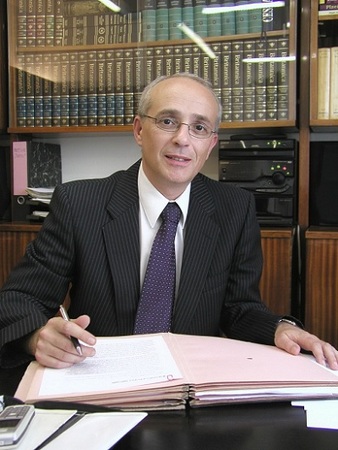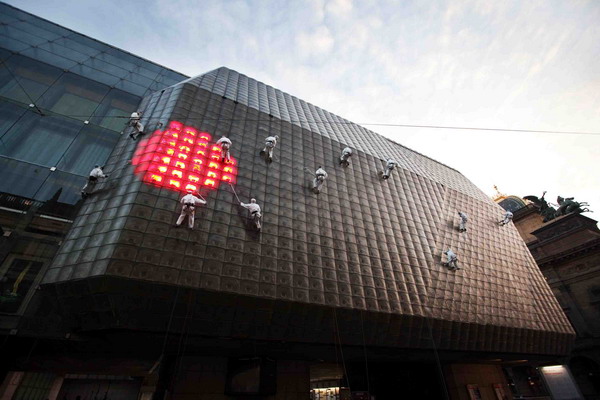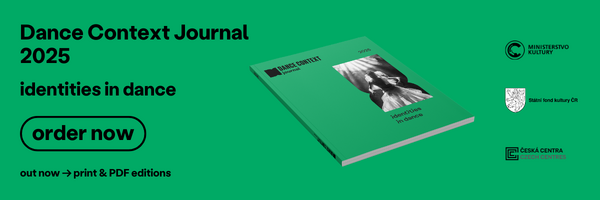Director of the National Theatre Prepares Organizational Changes, Cancelling the Position of Director of the New Stage
 Changes await the National Theatre in the New Year. "It is necessary to redefine the core business, purpose and mission of the National Theatre," says Doc. Jan Burian, "Artistic creation must be priority, realised by own artistic ensembles on our stages." With effect from 1st January a position of director of the New Scene is cancelled. Staff and repertoire will be transferred under the competence of artistic director of Drama Michael Dočekal.
Changes await the National Theatre in the New Year. "It is necessary to redefine the core business, purpose and mission of the National Theatre," says Doc. Jan Burian, "Artistic creation must be priority, realised by own artistic ensembles on our stages." With effect from 1st January a position of director of the New Scene is cancelled. Staff and repertoire will be transferred under the competence of artistic director of Drama Michael Dočekal. New Plans "The New Scene will be a space that will allow the National Theatre to feature mainly own chamber work, contemporary drama, presentation of unconventional texts, minority genres, atypical creation, the creation on the boundary between theatre and other types of art, " Michal Dočekal presents the vision. "Michal Dočekal as the artistic director of the ensemble that will be most represented on the New Stage, will also be the artistic supervisor of other dramaturgical lines," Jan Burian explains the change of the concept of the New Scene. Dočekal adds: "The program of the New Stage must conform to the profile of the National Theatre. New Scene should not be a “mere” production centre as it’s been till now." "I thank with the utmost respect current director Štěpán Kubišta for the work done on the implementation of a concept that was different," Jan Burian adds. The resigning Kubišta was offered another position in the National Theatre, matching his qualifications. Kubišta, however, failed to reflect the offer.
 New Stage 2010-2013
Since its opening in January 2010 the New Stage of the National Theatre has represented an open concept of contemporary theatre. It is practically the end of one era of the existence of the New Stage, the end of the concept applied by Štěpán Kubišta and his team.
In the last five years the New Stage of the National Theatre has become an establishment with particular dramaturgy. Kubišta's model of theatre as 'an open stage for the presentation of contemporary art projects' contrasted considerably with the previous era of the New Stage. Between 1992 and 2009 the New Stage only showed performances by Laterna magika with its primary audience composed of foreign tourists. Kubišta with his team took the challenge of offering innovative programme to attract new audience. The second challenge was Laterna magika, which used to be the most celebrated Czech multimedia project. Since 2012 the team of the New Stage has endeavoured to return Laterna magika to the world of internationally recognised theatres by adding three new performances to its repertory.
The New Stage as an institution contained not only the functioning of the theatre. In addition to that, Kubišta's concept enclosed new projects of Laterna magika, a programme focused on multimedia, projects in international cooperation as well as special events accessible free of charge at the square of piazzeta, etc. Contrary to the other sections of the NT, which focus only on theatrical projects, the programme of the New Stage has aimed at offering additional activities, which would attract new audience. This so-called 'audience development' has brought both national and international recognition to the New Stage. The original projects, which ran at the piazzeta even inspired some international institutions - in Germany, in the UK and elsewhere.
Regarding the financial side of the projects, the team of the New Stage have managed the impossible. The budget of the New Stage amounted to approximately 3 million CZK per annum after the deduction of remuneration, technical and operational expenses. Most of the New Stage's projects have however been covered from external resources, where as each project had had a fundraising plan from their initial stages on. Without such a plan the New Stage would not have been capable of attaining anything beyond the function of the routine repertory of the National Theatre ensembles and that of Laterna magika. Incidentally, the results of the fundraising activities of the New Stage have drawn attention of international institutions; students of cultural management under Fulbright Program along with international students from Charles University navigate towards the New Stage and the New Stage have been planning to expand its activities to the level of cooperation with Kennedy Arts Centre.
In the infrastructure of the National Theatre the New Stage has been an autonomous division with nominal personnel, compared to other departments. Despite that, the New Stage has proven its capacity of creating an innovative establishment capable of attracting new audience.
Furthermore, Kubišta's team gained another merit; the redevelopment of Laterna magika - the ensemble which has been active at the New Stage since 1992. Not only have its new projects attracted Czech audience, after extensive period they also succeeded in exporting of Laterna magika. What is more, under the New Stage the ensemble has introduced three performance projects in the last year.
The current team has negotiated the participation of many international celebrities of theatre on the programme of the New Stage: Alexander Ekmann, MatsEk, Phillipe Ghenty, Barber and Osgerby, David La Chapelle, Jiří Kylián, Marshmallow Laser Feast, Frieder Weiss, Nick Moran, CullbergBallet, Rimini Protokol, Constanza Macras, Tin CanCompany and many others have made their appearance.
Within special events, which have presented a third of the New Stage's programme, many unique projects in public space have been created that inspired cultural managers internationally. Some installations created for and shown on the piazzeta of the NT have been commented on and published in a printed version of the New York Times as well as in the European issue of the International Herald Tribune. An open space in its broadest sense - the profile of the New Stage - is testified by a long list of partner institutions participating in the creation of a variety of projects. For the last five years the New Stage has been a partner institution in the field of performing and visual arts, alternative projects as well as established festivals, the list of which would not fit in this text.
Kubišta says: „Not to close into oneself, to find common projects with other important partners and enable their creation is not only a need, but a necessity.” Prague, as well as Czech cultural scene, loses one of the most important cultural subjects of the last decade.
Source: National Theatre, New Stage
New Stage 2010-2013
Since its opening in January 2010 the New Stage of the National Theatre has represented an open concept of contemporary theatre. It is practically the end of one era of the existence of the New Stage, the end of the concept applied by Štěpán Kubišta and his team.
In the last five years the New Stage of the National Theatre has become an establishment with particular dramaturgy. Kubišta's model of theatre as 'an open stage for the presentation of contemporary art projects' contrasted considerably with the previous era of the New Stage. Between 1992 and 2009 the New Stage only showed performances by Laterna magika with its primary audience composed of foreign tourists. Kubišta with his team took the challenge of offering innovative programme to attract new audience. The second challenge was Laterna magika, which used to be the most celebrated Czech multimedia project. Since 2012 the team of the New Stage has endeavoured to return Laterna magika to the world of internationally recognised theatres by adding three new performances to its repertory.
The New Stage as an institution contained not only the functioning of the theatre. In addition to that, Kubišta's concept enclosed new projects of Laterna magika, a programme focused on multimedia, projects in international cooperation as well as special events accessible free of charge at the square of piazzeta, etc. Contrary to the other sections of the NT, which focus only on theatrical projects, the programme of the New Stage has aimed at offering additional activities, which would attract new audience. This so-called 'audience development' has brought both national and international recognition to the New Stage. The original projects, which ran at the piazzeta even inspired some international institutions - in Germany, in the UK and elsewhere.
Regarding the financial side of the projects, the team of the New Stage have managed the impossible. The budget of the New Stage amounted to approximately 3 million CZK per annum after the deduction of remuneration, technical and operational expenses. Most of the New Stage's projects have however been covered from external resources, where as each project had had a fundraising plan from their initial stages on. Without such a plan the New Stage would not have been capable of attaining anything beyond the function of the routine repertory of the National Theatre ensembles and that of Laterna magika. Incidentally, the results of the fundraising activities of the New Stage have drawn attention of international institutions; students of cultural management under Fulbright Program along with international students from Charles University navigate towards the New Stage and the New Stage have been planning to expand its activities to the level of cooperation with Kennedy Arts Centre.
In the infrastructure of the National Theatre the New Stage has been an autonomous division with nominal personnel, compared to other departments. Despite that, the New Stage has proven its capacity of creating an innovative establishment capable of attracting new audience.
Furthermore, Kubišta's team gained another merit; the redevelopment of Laterna magika - the ensemble which has been active at the New Stage since 1992. Not only have its new projects attracted Czech audience, after extensive period they also succeeded in exporting of Laterna magika. What is more, under the New Stage the ensemble has introduced three performance projects in the last year.
The current team has negotiated the participation of many international celebrities of theatre on the programme of the New Stage: Alexander Ekmann, MatsEk, Phillipe Ghenty, Barber and Osgerby, David La Chapelle, Jiří Kylián, Marshmallow Laser Feast, Frieder Weiss, Nick Moran, CullbergBallet, Rimini Protokol, Constanza Macras, Tin CanCompany and many others have made their appearance.
Within special events, which have presented a third of the New Stage's programme, many unique projects in public space have been created that inspired cultural managers internationally. Some installations created for and shown on the piazzeta of the NT have been commented on and published in a printed version of the New York Times as well as in the European issue of the International Herald Tribune. An open space in its broadest sense - the profile of the New Stage - is testified by a long list of partner institutions participating in the creation of a variety of projects. For the last five years the New Stage has been a partner institution in the field of performing and visual arts, alternative projects as well as established festivals, the list of which would not fit in this text.
Kubišta says: „Not to close into oneself, to find common projects with other important partners and enable their creation is not only a need, but a necessity.” Prague, as well as Czech cultural scene, loses one of the most important cultural subjects of the last decade.
Source: National Theatre, New Stage


